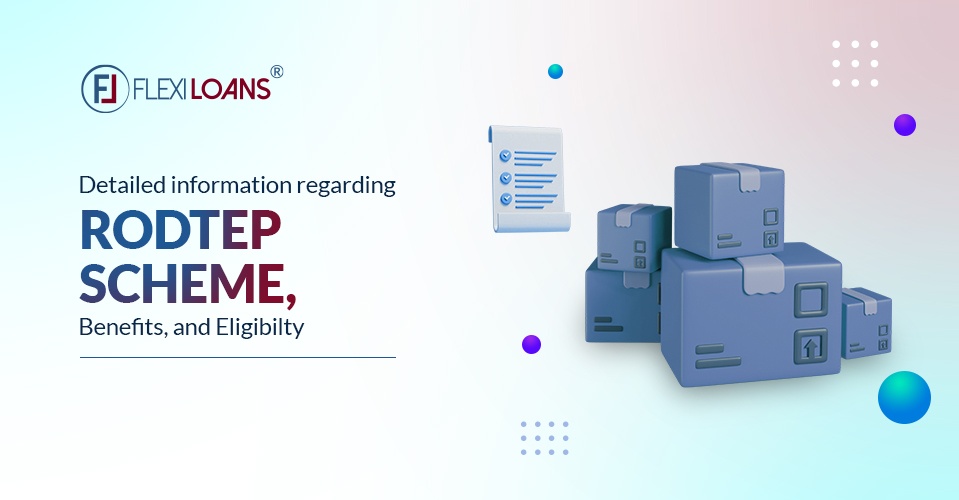Jul 07, 2023
Dec 16, 2025

What is RoDTEP?
RoDTEP, full form Remission of Duties and Taxes on Export Products, is an export promotion scheme by the government of India. The scheme became effective from January 1 2021 and aims to offset taxes and duties incurred on exported goods. It helps in reducing the input cost of exported goods, thereby ensuring goods made in India are competitive.
The RoDTEP scheme offers rebates on all central, state, and local duties/taxes/levies on exported goods. This covers both direct and indirect costs borne by the exporters and cumulative indirect taxes at prior stages of production. The objective is to compensate for the duties/taxes/levies on goods and services used in the production and distribution of exported goods.
Objectives of RoDTEP
The objectives of the RoDTEP scheme are as follows:
- Neutralise taxes and duties on exported goods
- Provide relief to exporters by reimbursing the costs of hidden taxes and duties
- Reduce the burden of input costs on exporters, thereby making India-made products and services more competitive internationally
- Promote, support, and encourage export activities in India by reducing the cost of exports
- Facilitate economic growth by reducing the tax burden on exporters.
Features of the RoDTEP Scheme
The features of the RoDTEP scheme are as follows:
- Refund of Embedded Duties and Taxes
The scheme actively promotes the export of goods and services exclusively. Earlier, exporters included taxes and duties as input costs and passed them on to their international buyers. Through RoDTEP, exporters can claim refunds and lower their selling prices. Some of the common taxes and duties for which rebates are available are:- Duties on the purchase of electricity
- VAT and excise duty on fuel used on transportation cost for diesel generator (DG) sets and power plants
- Stamp duty on export documents
- Property tax/municipal tax/mandi tax.
- WTO Compliance
RoDTEP is a policy compliant with World Trade Organization (WTO) guidelines and is designed to assist exporters in meeting international standards. The scheme enables exporters to enhance their goods’ cost competitiveness in the global market. By providing assured duty benefits, it supports exporters in offsetting taxes and making their products more attractive to international buyers. - Multi-Sector Strategy
The scheme ensures uniformity across all sectors. However, certain sectors like steel, pharmaceuticals, and organic and inorganic chemicals are excluded at present from the benefits provided. - Digitalisation and Transparency
The RoDTEP scheme emphasises digitalisation and transparency in the application and processing of rebates. It aims to simplify the procedures by leveraging technology and ensuring quick disbursal of benefits to exporters. - Complementary to Other Schemes
The scheme is complementary to existing export promotion schemes such as the Merchandise Exports from India Scheme (MEIS). It provides an additional benefit by covering taxes and duties not addressed by other schemes.
These features collectively make the RoDTEP scheme a comprehensive mechanism for compensating exporters for the taxes and duties incurred on exported goods, thereby supporting and encouraging export activities in India.
Eligibility for the RoDTEP Scheme
Here are the key eligibility criteria for the scheme:
- Most sectors, including textiles, can enjoy the benefits provided, with the exception of certain industries such as steel, pharmaceuticals, and organic and inorganic chemicals.
- The scheme will give priority to labour-intensive sectors that already receive benefits under the MEIS.
- Both manufacturer exporters and merchant exporters (traders) are eligible for the scheme.
- There is no specific turnover threshold required to claim the RoDTEP scheme benefits.
- Re-exported products are not eligible for benefits under the scheme; only products of Indian origin are eligible.
- Special economic zone (SEZ) units and export-oriented units (EOUs) are eligible for the benefits.
- The scheme also applies to goods exported via courier through e-commerce platforms.
Exporters need to meet these eligibility criteria and adhere to the guidelines provided by the government and the relevant authorities to enjoy the benefits of this scheme.
Sectors Ineligible for RoDTEP
The following categories of exports/exporters are not eligible for rebate under this export promotion scheme:
- Export of imported goods meant for re-export
- Trans-shipment exports, where the goods originate in a third country but pass through India
- Export products that are subject to a minimum export price or export duty
- Supplies of products from domestic tariff area (DTA) units to SEZ and free trade warehousing zone (FTWZ) units
- Products manufactured in electronic hardware technology parks (EHTPs) and biotechnology parks (BTP)
- Products manufactured or exported by units licenced as 100% EOUs
- Goods that have been put to use after manufacture.
Importance of the RoDTEP Scheme in India
The government introduced this scheme to address various needs and challenges faced by exporters in the country. The key needs for implementing this scheme are as follows:
- Boost Export Competitiveness: The scheme aims to enhance the competitiveness of Indian exports in the global market. Reducing the embedded taxes and duties on exported goods helps exporters offer their products at more competitive prices.
- Neutralise Unrefunded Taxes: Previously, various taxes and duties applied on exported goods, which led to an increase in costs for exporters. The RoDTEP scheme neutralises these unrefunded taxes and levies, thus ensuring a level playing field for Indian exporters.
- Address Hidden Taxes and Duties: The previous embedded taxes and duties in exported goods stemmed from various central, state, and local bodies, which led to hikes in costs. This scheme targets these hidden taxes and aims to provide relief to exporters by refunding or remitting them.
- Support Cash Flow for Exporters: In the past, exporters often faced challenges in terms of blocked working capital due to the unavailability of timely refunds on taxes and duties. The RoDTEP scheme helps in addressing this issue by providing assured duty benefits and improving cash flow for exporters.
- Promote Export-led Growth: The government’s objective is to promote export-led growth as a driver of the economy. By reducing the burden of taxes and levies, this scheme incentivises exporters and encourages them to expand their export activities, contributing to economic growth and employment generation.
- Align with International Trade Standards: RoDTEP helps Indian exporters meet international trade standards by making their goods cost-competitive in the global market. It aims to align India’s export policies with international norms, enhancing the country’s export performance.
Overall, the RoDTEP scheme addresses the needs of exporters, promotes export competitiveness, supports cash flow, and contributes to the growth of India’s export sector while aligning with global trade standards.
Are you an exporter looking for a business loan at low interest? Click here to apply now!
Conclusion
The RoDTEP scheme has emerged as a significant policy initiative in India, aiming to boost export competitiveness and provide much-needed relief to exporters. By refunding or remitting unrefunded taxes and duties on exported goods, the scheme promotes a level playing field and enhances the country’s export potential. Its inclusive nature, covering a wide range of various sectors and industries, reflects the government’s commitment to supporting a variety of exporters.
However, it is essential for exporters to understand the eligibility criteria and comply with the scheme’s guidelines to fully benefit from it.
Frequently Asked Questions (FAQs)
The full form of RoDTEP is the Remission of Duties and Taxes on Export Products.
This scheme actively extends its benefits to most goods and services exported from India, except in certain ineligible sectors.
Sectors such as steel, pharmaceuticals, and organic and inorganic chemicals, are currently excluded from the benefits of this scheme.
No, re-exported products are not eligible for benefits under this scheme. All of the applicable exported products and services must originate in India.
Yes, this scheme is compliant with World Trade Organization (WTO) regulations.
This scheme supports exporters by providing assured duty benefits, neutralising unrefunded taxes, and improving cash flow.
RoDTEP (full form: Remission of Duties or Taxes on Export Products) is an Indian government initiative that aims to refund unrefunded taxes and duties on exported goods, thus enhancing the country’s export competitiveness.
The government of India introduced this scheme in 2021. It became effective on January 1 2021 and is valid until 2025.
No, it is not possible to claim RoDTEP and Merchandise Exports from India Scheme (MEIS) benefits simultaneously.
This scheme actively prohibits the carrying over of remission of arrears or contingent liabilities to the next financial year.







